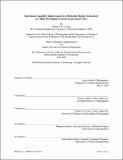| dc.contributor.advisor | Jeremie Gallien. | en_US |
| dc.contributor.author | Vokoun, Matthew R. (Matthew Richard) | en_US |
| dc.contributor.other | Leaders for Manufacturing Program. | en_US |
| dc.date.accessioned | 2007-01-10T19:40:06Z | |
| dc.date.available | 2007-01-10T19:40:06Z | |
| dc.date.copyright | 2005 | en_US |
| dc.date.issued | 2005 | en_US |
| dc.identifier.uri | http://hdl.handle.net/1721.1/35697 | |
| dc.description | Thesis (M.B.A.)--Massachusetts Institute of Technology, Sloan School of Management; and, (S.M.)--Massachusetts Institute of Technology, Dept. of Chemical Engineering; in conjunction with the Leaders for Manufacturing Program at MIT, 2005. | en_US |
| dc.description | This electronic version was submitted by the student author. The certified thesis is available in the Institute Archives and Special Collections. | en_US |
| dc.description | Vita. | en_US |
| dc.description | Includes bibliographical references (leaves 108-110). | en_US |
| dc.description.abstract | The Broad Institute is a research collaboration of MIT, Harvard University and affiliated hospitals, and the Whitehead Institute for Biomedical Research. Its scientific mission is to "(1) create tools for genomic medicine and make them broadly available to the scientific community and (2) apply these tools to propel the understanding and treatment of disease." The Broad Institute contains the world's largest high throughput genome sequencing center, which contributed approximately one third of the sequence for the Human Genome Project (HGP) completed in 2003. The Molecular Biology Production Group (MBPG) is the most upstream part of the Broad Institute's genome sequencing operation. This group is responsible for incoming DNA quality control, construction of DNA Libraries, and production of agar plates containing E.coli cell colonies (with many of copies of DNA). In this way, MPBG scales up raw DNA to a quality and quantity necessary for the subsequent high-volume, automated genome sequencing process. While most of the genome sequencing process at the Broad Institute had already been highly industrialized, MBPG had not yet undergone such a transformation and was still operated more like a laboratory than a manufacturing group. | en_US |
| dc.description.abstract | (cont.) This low level of operations capability resulted in a highly variable output from MBPG processes in terms of quantity, physical quality, and data quality. Additionally, the MBPG processes were not well understood or measured, yet had a very significant effect on downstream processes in the genome sequencing center. Thus, the goal of this thesis was to create a framework for improving the operations capability of a molecular biology laboratory in a high throughput genome sequencing center. This framework defined an operations strategy of maximizing quality in MBPG, characterized the group's sources of quality problems, implemented lean manufacturing and production forecasting in MBPG, and defined future opportunities for MBPG to implement Six Sigma and RFID. This thesis work resulted in significant quality improvements in MBPG as well as a much more industrial approach to the management of the laboratory's operations. More broadly, this thesis work can be applied to the operations capability improvement of any high-throughput laboratory in the biotechnology and pharmaceutical industry. | en_US |
| dc.description.statementofresponsibility | by Matthew R. Vokoun. | en_US |
| dc.format.extent | 132 leaves | en_US |
| dc.format.extent | 22602529 bytes | |
| dc.format.extent | 22603270 bytes | |
| dc.format.mimetype | application/pdf | |
| dc.format.mimetype | application/pdf | |
| dc.language.iso | eng | en_US |
| dc.publisher | Massachusetts Institute of Technology | en_US |
| dc.rights | M.I.T. theses are protected by copyright. They may be viewed from this source for any purpose, but reproduction or distribution in any format is prohibited without written permission. See provided URL for inquiries about permission. | en_US |
| dc.rights.uri | http://dspace.mit.edu/handle/1721.1/7582 | |
| dc.subject | Sloan School of Management. | en_US |
| dc.subject | Chemical Engineering. | en_US |
| dc.subject | Leaders for Manufacturing Program. | en_US |
| dc.title | Operations capability improvement of a molecular biology laboratory in a high throughput genome sequencing center | en_US |
| dc.type | Thesis | en_US |
| dc.description.degree | S.M. | en_US |
| dc.description.degree | M.B.A. | en_US |
| dc.contributor.department | Leaders for Manufacturing Program at MIT | en_US |
| dc.contributor.department | Massachusetts Institute of Technology. Department of Chemical Engineering | |
| dc.contributor.department | Sloan School of Management | |
| dc.identifier.oclc | 64561170 | en_US |
